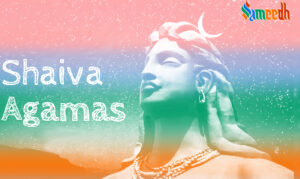Shaiva Agamas are a category of scriptures that are central to the Shaiva tradition within Hinduism. The term “Agam” refers to a traditional or authoritative text, and these texts provide guidelines for rituals, worship, philosophy, and the construction of temples dedicated to Lord Shiv.

The Shaiva Agamas are considered sacred and authoritative by followers of Shaivism. There are various Shaiva Agamas, and they are broadly classified into three categories:
- Shaiva Siddhant Agamas: These scriptures form the basis for the Shaiva Siddhant tradition, a major philosophical school within Shaivism. They focus on both the ritualistic and philosophical aspects of Shaivism.
- Shaiva Kaula Agamas: Kaula refers to a more esoteric and tantric aspect of Shaivism. The Kaula Agamas emphasize rituals, meditation, and yoga practices, including the use of mantras and yantras. These texts are often associated with the worship of Shakti (the Divine Feminine) as well.
- Shaiva Bhairav Agamas: The Bhairav Agamas are known for their emphasis on the worship of Lord Bhairav, a fierce and powerful aspect of Lord Shiv. These texts delve into various forms of worship, meditation techniques, and rituals related to Bhairav.
It’s important to note that the Agamas provide detailed instructions on temple construction, consecration ceremonies (kumbhabhishek), worship rituals, and the performance of various sacraments (samskara). They cover a wide range of topics, including cosmology, cosmogony, theology, and practical guidance for spiritual seekers.
The Shaiva Agamas are a diverse collection of texts that provide guidance on various aspects of worship, rituals, philosophy, and temple construction related to Lord Shiv. The Shaiva Agamas encompass a variety of texts, each with its own focus on different aspects of worship, rituals, and philosophy related to Lord Shiv.
While there are numerous Agamas, Here a a few well-known ones from different categories:
- Kamika Agama: This is a significant Shaiva Agama that covers a wide range of topics, including temple construction, rituals, and philosophical teachings. It emphasizes the worship of Lord Shiv and is highly regarded in the Shaiva Siddhanta tradition.
- Karana Agama: This Agama focuses on the construction and consecration of temples dedicated to Lord Shiva. It provides detailed instructions on the installation and worship of the deity in the temple. It emphasizes the worship of Lord Shiv and is highly regarded in Jnana Agamas (knowledge) in the Shaiva Siddhanta tradition.
- Makuta Agama: Makuta Agama deals specifically with the rituals and worship associated with the sacred crown (makuta) worn by the deity in the temple. It provides guidelines for the design, consecration, and rituals related to the crown. It emphasizes the worship of Lord Shiv and is highly regarded in Yoga Agamas (discipline) in the Shaiva Siddhanta tradition.
- Vijaya Bhairav Agama: Dedicated to the worship of Lord Vijaya Bhairav, this Agama provides instructions on the installation and rituals associated with this particular form of Bhairav, who is considered victorious and auspicious. It emphasizes the worship of Lord Shiv and is highly regarded in the Shaiva Bhairav tradition.
- Raurava Agama: This Agama focuses on the worship of Lord Raurava, another form of Bhairav tradition. It includes guidelines for rituals, mantras, and meditation practices associated with this specific aspect of Lord Shiv. It emphasizes the worship of Lord Shiv and is highly regarded in Kriya Agamas (rituals) in the Shaiva Siddhanta tradition.
- Kirana Agama: Kirana Agama is dedicated to the worship of Lord Kirana, a form of Shiv. It provides insights into temple rituals, including consecration procedures, daily worship, and special festivals related to Lord Kirana.
It’s important to note that the list above is not exhaustive, and there are many more Shaiva Agamas, each with its unique focus and teachings. Additionally, different sects within Shaivism may follow specific Agamas based on their traditions and interpretations. The study and practice of Shaiva Agamas are integral to the worship and spiritual life of Shaivites.
While the Vedas are considered the primary scriptures in Hinduism, the Agamas hold a significant place in the Shaiva tradition, shaping the religious and philosophical practices of Shaivites. It’s worth mentioning that the content and classification of Agamas may vary among different sects and sub-traditions within Shaivism.